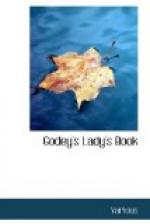about him, he went into some fuller particulars, which
set them all agog. These, reaching the ears of
Colonel Jones, led to an interview, from which he
gathered that Greenleaf was one of a large crew commissioned
by the Brazils in 1826; that, after cruising a long
while in a latitude swarming with Spanish vessels
of war, they got reduced to twenty-five men, all told.
That one day they fell in with a large, heavily-laden
ship, from which they took about three hundred and
fifty thousand dollars, in gold and silver, and a
massive gold cross, nearly two feet long, and weighing
from fifteen to twenty pounds, belonging to a Spanish
priest; but what they did with the crew and the passengers,
or with the ship and the priest, did not appear.
That, soon after getting their treasure aboard, they
saw a large sail to windward, which they took to be
a Spanish frigate; and, being satisfied with their
booty, they altered their course, and steered for a
desolate island near Guadaloupe, where, after taking
out three hundred doubloons apiece, they landed, with
the rest of the treasure packed in gun-cases, and
hooped with iron; dug a hole in the earth and buried
it; carefully removing the turf and replacing it,
and carrying off all the dirt, and scattering it along
the shore. That they took the bearings of certain
natural objects, and marked the trees, and agreed
among themselves, under oath, not to disturb the treasure
till fifteen years had gone by, when it was to belong
to the survivors. That, having done this, they
steered for the Havana, and, after altering their
craft to a fore-and-aft schooner, sold her, and shared
the money. Being flush, and riotous, and quarrelsome,
they soon got a-fighting among themselves; and, within
a few months, by the help of the yellow fever, not
less than twenty-three out of the whole twenty-five
were buried, leaving only this Greenleaf and an old
man, who went by the name of Thomas Taylor, and who
had not been heard of for many years, and was now
believed to be dead.
A fortune-teller was consulted, and put into a magnetic
sleep, and, if the description they had painted of
the man they were after could be depended on by her,
they would find him, under another name, in a national
ship on the East India station.
Here the Colonel began rubbing his hands again.
It appeared, moreover, that Taylor and Greenleaf had
met more than once, and consulted together, and made
two or three attempts to charter a vessel; but, being
poor and among strangers, and afraid of trusting to
other people—no matter why—they
finally agreed to lie by till they were better off,
and not be seen together till they should be able to
undertake the enterprise without help from anybody.
“But,” said Greenleaf. “I am
tired of waiting. He may be dead for all I know
He was an old man. At any rate, he is beyond my
reach, out of hail; and so, d’ye see, if you’ll
rig us out a small schooner, of not more than seventy-five
or eighty tons, I will go with you, and ask for no
wages; and here’s the landlord’ll go,
too, on the same lay; and, if you’ll give me
a third of what we find, I’ll answer for Taylor,
dead or alive, and you shall be welcome to the rest,
and may do what you like with it.”




